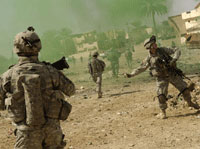Storm in Iraqi Desert: Stable and Brutal
Iraq is preparing for parliamentary elections planned March 7, 2010. The voting should become a convincing sign of the normalized situation in the country for both the existing government and the US administration. Yet, pre-election news reminds military reports.

After the overthrow of Saddam Hussein’s regime in 2003, the Iraqi Parliamentary elections were held in January 2005. The country was struck by violence. Although the situation has improved since then, it is getting aggravated once again. For example, recently in the city of Karbala, there were several explosions during the annual pilgrimage to the burial place of Shiite Islam’s most revered martyr. As a result, 77 pilgrims were killed and over 300 injured.
The situation is alarming in Basra, the largest city in the South of the country. The local provincial council had to ban gathering alms for the duration of the election campaign because extremists disguised as beggars could attack candidates and their agents. The officials were not afraid of mass riots of multiple beggars.
Not all candidates were registered. The “black list” includes 500 people. Although the list is represented by both Sunni and Shiite communities, Sunnis decided that blacklisting was targeted at them. They began burning or ruining portraits of Shiite candidates, and Shiites reciprocate.
There are talks in the country about the danger of new interfaith opposition. Al Qaeda decided to side with Sunni. The leader of its Iraqi wing Abu Omar al-Baghdadi threatened to disrupt the election. It is not hard to imagine which way it will be done.
Iraq is a multinational country. Shiite Arabs residing mostly in the center and in the south account for 55 percent of the population. Sunni Arabs residing in the center and in the west account for less than 20 percent. Kurds who live in the north represent over 20 percent. The rest of the country population is Iraqi Turkmen (mostly Sunni) and various types of Christians.
The relations between these communities were always complicated. Under Saddam, the power was in the hands of Sunnis, who brutally oppressed Shiites and Kurds. The Americans who invaded the country placed their bets on those oppressed by Hussein. However, it resulted in a horrible wave of interfaith and interethnic violence and endless political conflicts between the representatives of different forces.
Shiites won the 2005 elections to the constituent assembly (similar to Parliament). In the Fall Shiites spoke against the new constitution that was to turn the Iraqi unitary state into a federal one, as they believed it was the first step towards the country’s collapse. They also thought it to be unfavorable for the country’s economic interests since every community would receive a right to manage its oil deposits on its own discretion. The areas where Sunnis resided did not have much oil.
Thanks to the interference of the League of Arab States, after a long negotiation between representatives of three communities in October of 2005, the Constitution was accepted. Two months later, the Parliament elections were held, and all three communities won seats. The US administration reported that the situation in occupied Iraq has stabilized.
In reality, a significant part of Shiite population started jihad against the Americans and collaborationists. Sunnis attacked as well, and the US officials had to give the town of Al Falluja to the town rebels. They pay every soldier of “Sunni police” $300 a month for peaceful behavior.
Conflicts also arose between Shiites and Sunni, Sunni and Kurds. In 2006, the dome of the al - Askari Mosque in Samarra was destroyed by an explosion. The country plunged into international and interfaith conflicts. Terrorist attacks became a norm, and dozens of bodies with traces of torture were found in the streets. Al Qaeda made its own contribution into the terrorist chaos.
The conflicts would subside and then arise again. Despite hopes of the Americans, Iraq did not see an extended period of stabilization. Now, as the elections come near, the situation is getting aggravated.
"A pretty picture of a peaceful country painted by the Americans does not match the reality,” said Sergey Dimidenko, an Orientalist and expert with the Institute for Strategic Evaluation and Analysis in his interview with Pravda.ru. “The pre-elections situation is good evidence. Most likely, the elections will be held without Sunni candidates. The pro-Shiite government does not let many of them register saying that they were members of the Baath party under Hussein, responsible for the genocide of Shiites. They are able to do it since Iraqi Sunnis lack serious organizations and leaders. It is very likely that only representatives of Shiite Arabs and Kurds will take seats in the Parliament.
When the occupational forces leave, the situation in Iraq will be even more aggravated. There will be a power vacuum which will provoke a brutal conflict between Sunnis and Shiites. There will be a serious threat to the country’s territorial integrity. It has already pretty much lost its North populated with Kurds. The rest of the country populated with Arabs will be next. What the Americans call “stabilization” is only a calm before the storm", the expert says.
Sergey Balmasov
Vadim Trukhachev
Pravda.Ru
Russia Today: US funds sent from Iraq to al-Qaeda
Subscribe to Pravda.Ru Telegram channel, Facebook, RSS!




